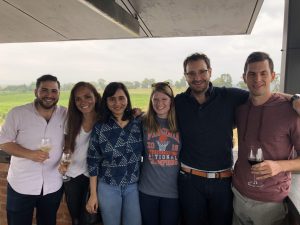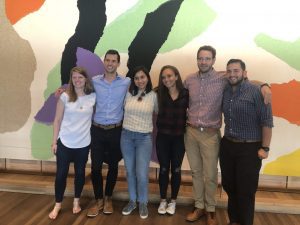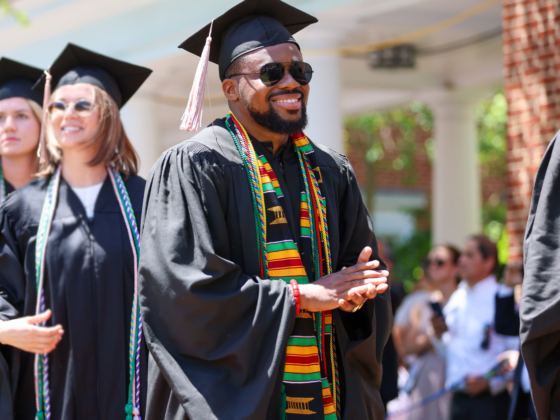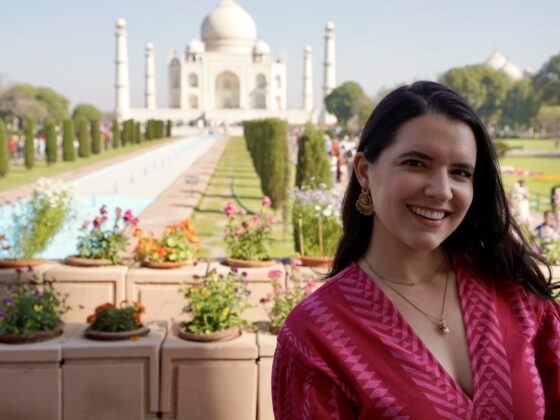Pallabi Chakraborty, currently a Second Year student at Darden, recently participated in the Darden Worldwide Course to Australia, a new offering this year. Prior to coming to Darden, Pallabi worked in the data and policy industry and earned an undergraduate degree from West Bengal University of Technology and a Master’s Degree in Public Policy Analysis at UCLA. Between her first and second years at Darden, Pallabi interned with Amazon. She shared some of her reflections on key themes from the Darden Worldwide course, in her own words:
Nature
We arrived in Australia at a very difficult time for many Australians because of the ravaging bushfires. Through our conversation with McKinsey Partner Cameron Leitch we began to  understand the enormity of the situation. The devastation has now caused Australia’s federal government to reconsider their land management policies, including a look to the past by working with Aboriginal people to understand the style of land management they built through years of practical experience to prevent wildfires.
understand the enormity of the situation. The devastation has now caused Australia’s federal government to reconsider their land management policies, including a look to the past by working with Aboriginal people to understand the style of land management they built through years of practical experience to prevent wildfires.
At Rochford Winery in the Yarra Valley, we learned that the smoke has made its way into the skin of the grapes, giving the red wine an ashy finish. I wondered, in these times of climate change, when the earth is literally and metaphorically burning, a new era of adaptive consumer products will emerge.
During our time in Sydney and Melbourne, we were pleasantly surprised to see the complete absence of plastic bottles in hotels and restaurants, replaced with reusable glass bottles instead. Many restrooms did not have paper towels to dry hands. Even in the ones that were stocked with paper towels, we noticed locals still using only the air dryers. At the Sydney Opera House, we learned about how rainwater washes the dirt and grime off the sails of the Opera House and then passes through a filtration system built into the granite floor before flowing into the bay.
A couple of us were able to witness the Sydney chapter of the country-wide climate march. It was heartwarming to see young students and professionals from all walks of life come out to protest government inaction on climate change. The local police and volunteers, they themselves very young, did a fantastic job of maintaining law and order to ensure the protest proceeded smoothly.
It was clear to us that Australia deeply cares about the environment, but of course, across the world we have a long way to go.
Race
An exciting detail I noticed was that most of our events started with a traditional Aboriginal welcome. The welcome thanked the custodians of the land and the Aboriginal nation, as well as, the elders past, present and future. While a small gesture, it demonstrated a nod to the historically shaped culture of the country and the present effort to recognize and develop Aboriginal identity in modern Australia.
Our group visited the Clontarf Foundation and learned about how the organization engages with disadvantaged Aboriginal boys to provide them with access to education, employment opportunities and a better life. My understanding is that Clontarf is one of several significant organizations in Australia working to support disadvantaged youth in the country.
One of my peers made a profound statement during the concluding reflection session of the course about how she felt less black in Australia. The comment made me reflect upon the world’s tortured history with indigenous populations and how racial inclusivity can be achieved without the loss of identity. While race relations within Australia are not perfect, the balance of maintaining cultural continuity without drawing decisive and divisive ethnic boundaries was different than what I have seen in some other countries.
Gender
It was interesting to me how representatives from the Melbourne Football Club, as well as Simon Katich, a well-renowned cricketer, discussed at length about how women have been traditionally ignored in sports and not paid on-par with their male counterparts. They spoke industriously about initiatives for more inclusivity in the space.
Throughout our tour of the operation center at Qantas headquarters, our guide discussed the role weatherpeople play in helping aircrafts take off and land safely. The guide initially mentioned “weathermen” before immediately correcting himself to say “weatherperson”, exhibiting his desire to use inclusive language at all times. During our visit to Westpac bank, half of the members on the panel that we heard from were women. Through my experience, I have not typically seen high-powered women executives on panels like this in most other parts of the world.
Economy/ Business
 At the Australian Ballet Company, we heard from the Company’s Chairman Craig Dunn, who emphasized a desire for the ballet to stay relevant. The Company knows that youngsters represent a significant faction of consumers, and businesses have opened their arms to making themselves millennial-friendly by finding ways to engage with this demographic, e.g. using social media. This sentiment contrasts with others I’ve heard. Last quarter, I was in a Darden course, where some students stressed the importance of staying “true to themselves” by following age-old traditions. Such a stance has always made me wonder if moving with the times is an underestimated business strategy and should be explored more. Mr. Dunn also spoke to the importance of shape and size inclusivity in the world of ballet, which is of importance to current customers. My experience at the Australian Ballet Company echoed a motif seen throughout our trip of positioning the commerce, politics and society of a modern Australia without losing the ethos of what gave rise to the Commonwealth’s dynamism.
At the Australian Ballet Company, we heard from the Company’s Chairman Craig Dunn, who emphasized a desire for the ballet to stay relevant. The Company knows that youngsters represent a significant faction of consumers, and businesses have opened their arms to making themselves millennial-friendly by finding ways to engage with this demographic, e.g. using social media. This sentiment contrasts with others I’ve heard. Last quarter, I was in a Darden course, where some students stressed the importance of staying “true to themselves” by following age-old traditions. Such a stance has always made me wonder if moving with the times is an underestimated business strategy and should be explored more. Mr. Dunn also spoke to the importance of shape and size inclusivity in the world of ballet, which is of importance to current customers. My experience at the Australian Ballet Company echoed a motif seen throughout our trip of positioning the commerce, politics and society of a modern Australia without losing the ethos of what gave rise to the Commonwealth’s dynamism.
All in all, the Darden Worldwide Course to Australia was a brilliant experience. I am aware that experiences outside the central business districts, in the suburbs as well as the interior of the country hold many more lessons, and I am looking forward to my next visit already!





